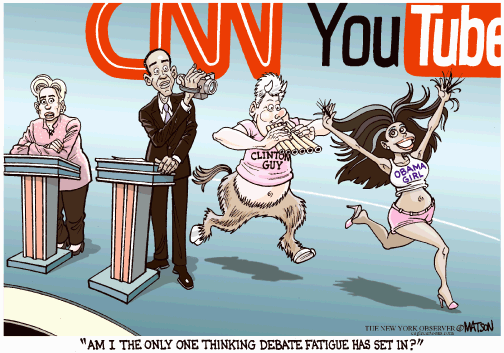 By MARTIN SCHRAM Scripps Howard News Service July 26, 2007
This first-of-its-kind video/Internet campaign debate featured ordinary people doing what real journalists usually do: Questioning the candidates. It also featured CNN journalists doing what journalists too often do: Confusing news with entertainment, and especially, confusing undebatable gotcha-journalism questions with vital policy questions that need to be fully debated and challenged if we are ever going to get our country right again. More than 3,000 people had videotaped themselves asking questions that were then fed through YouTube to CNN. The CNN journalists then selected 30 or so to be asked in the debate. They included a talking snowman, a song about taxes, two hillbillies yucking it up like refugees from "Hee-Haw," one freebie commercial from each candidate's camp. Then there was the Kansas guy who asked Sen. Barack Obama of Illinois whether he is "not authentically black enough" -- a one-on-one gotcha question that can't be debated by the others. And this debate-lite closer: a Colorado guy asked the candidates to say what they liked and disliked about the candidate to their left. Pathetically, they did as they were told.  Artist RJ Matson, The New York Observer Distributed to subscribers for publication by Cagle Cartoons, Inc.
His personal best came on a question taped in Darfur about what the United States should do to halt the genocide in that region of Sudan. New Mexico Gov. Bill Richardson served up a list of diplomatic initiatives plus a U.N. peacekeeping force. Cooper pressed: "Does that mean American troops?" It did not. Next he asked Sen. Joe Biden of Delaware the same question: Send U.S. troops to Darfur? "Absolutely, positively," Biden shot back, 2,500 troops. "... Those kids will be dead by the time the diplomacy is over." Cooper then asked Sen. Hillary Rodham Clinton of New York if she agreed with Biden that U.S. troops should be sent to Darfur. Her reply was instant and positive-sounding: "I agree completely that what we need to do is start acting instead of talking. That means accelerating the United Nations peacekeeping forces along with the African Union. It means moving more quickly on divestment and sanctions on the Sudanese government ..." But Cooper bore in: "How about American troops on the ground?" Clinton finessed: "I think NATO has to be there with the no-fly zone, and I think that only the United States can provide the logistical support and the airlift to make a no-fly zone and the actual delivery of humanitarian aid work." Cooper: "Just in the spirit of trying to get the answer, does that mean no American ground troops?" Clinton was nailed: "American ground troops I don't think belong in Darfur at this time. ...We've got to figure out what we're doing in Iraq, where our troops are stretched thin, and Afghanistan, where we're losing the fight to al Qaeda and bin Laden." Next came Iraq. A Philadelphia fellow asked: "My question for all the candidates: How do we pull out now? ... Don't you think if we pulled out now that would open it up for Iran and Syria, God knows who ...?" Obama said he'd opposed the invasion from the outset, and pushed his phased-troop-withdrawal idea -- but never addressed the core question: What would be the consequences on the ground of the U.S. troop withdrawal? This time, the beleaguered moderator failed to follow up. Instead, he asked the same question of Biden, who went his own way. Cooper just drifted on to other Iraq questions. No candidate was forced to confront the real consequences of his proposal for unwinding America's un-won war. Would the smaller numbers of U.S. troops left behind in a phased withdrawal be in greater danger? Would Iraq's concentric civil wars erupt massively? Would tens of thousands of Iraqis die? President Bush has said he will leave it to his successor to find a way of getting the last of America's troops out of Iraq. That is why a full hour of real debate among these would-be successors on the combat-zone consequences of a troop withdrawal could have made Monday's CNN-YouTube debate the first major event in Campaign 2008. What we got instead was an entertaining night of political theatrics and high jinx, a harbinger of the decline and drift of journalism in the blog-beguiled Internet age.
E-mail him at martin.schram(at)gmail.com Distributed to subscribers for publication by Scripps Howard News Service, http://www.scrippsnews.com
|